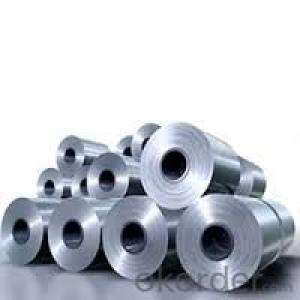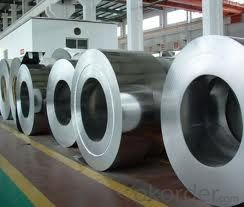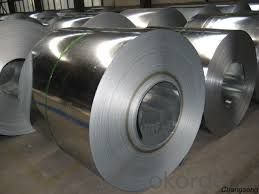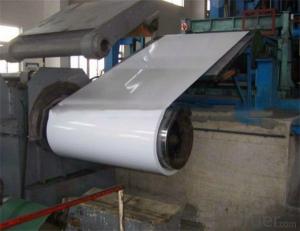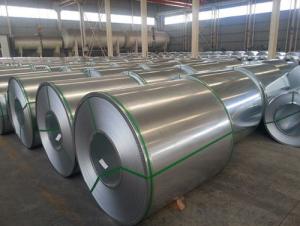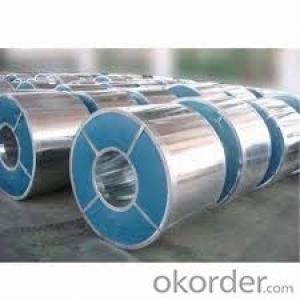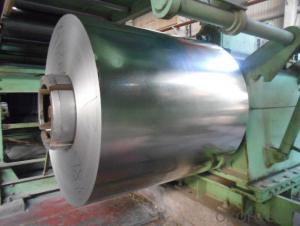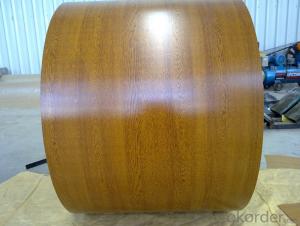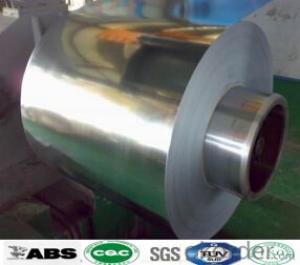Steel Coil Price 2015 New Products Hot Dipped Galvanized
- Loading Port:
- Shanghai
- Payment Terms:
- TT OR LC
- Min Order Qty:
- 50 m.t.
- Supply Capability:
- 60000 m.t./month
OKorder Service Pledge
OKorder Financial Service
You Might Also Like
| Place of Origin: | Hebei China (Mainland) | Brand Name: | CNBM | Model Number: | pre-painted galvanized steel coil |
| Type: | Steel Coil | Technique: | Hot Rolled | Surface Treatment: | Galvanized |
| Application: | Container Plate | Special Use: | High-strength Steel Plate | Width: | from 914mm to 1250mm |
| Length: | 1000-2000m | Certification:: | ISO9000 |
Packaging & Delivery
| Packaging Detail: | seaworthy packing or as your requirement |
| Delivery Detail: | 20-45 days after receive down payment. |
Specifications
1.Thickness: 0.15mm-1.5mm
2.Width:914mm-1250mm
3. z40-z275g/m2
4. color: all Ral
CNBM INTERNATIONAL
CNBM International Corporation (CNBM International) is the most important trading platform of
CNBM Group Corporation, a state-owned company under the direct supervision of State-owned Assets
Supervision and Administration Commission of the State Council.
As of the end of 2012, CNBM’s total assets exceeded RMB 300 billion, with more than 150,000
employees, and 20 companies under direct management with 100% share control or majority control,
among which 6 were listed companies, including 2 overseas listed. CNBM ranked NO.319 in the Top
Fortune World 500 of 2013 with 34.46 billion dollars revenue.
For now, we have established strategic partnerships with hundreds of domestic manufacturers and
extensive business relations with clients from over 120 countries in the fields of building materials and
equipments by making full use of its absolute superiority in both abundant source and solid technology
support. Currently, we have wholly-owned overseas subsidiaries and branches in 5 countries with a view
to realize localization, which also represents an essential progress in our globalization target.
STEEL SHEET/COIL DEPARTMENT
Our department is specialized in manufacturing and exporting the following products.
HOT ROLLED STEEL
COLD ROLLED STEEL
HOT-DIP GALVANIZED/ALUZINC STEEL
PRE-PAINTED GALVANIZED/ALUZINC STEEL
PRINTING STEEL
We can ensure that stable quality standards are maintained, strictly meeting both market
requirements and customers’ expectations. Our products enjoy an excellent reputation and have been
exported to Europe, South-America, the Middle-East, Southeast-Asia, Africa and Russia etc.. We sincerely
hope to establish good and long-term business relationship with your esteemed company.
COMPANY
PROFILE
- 1 -
- 2 -
Steel Coil/Sheet
CNBM UAE
CNBM INDIA
CNBM GERMANY
CNBM BRAZIL
CNBM K.S.A
CNBM INDONESIA
CNBM THAILAND
CNBM SOUTH AFRICA
- Q: Hello,I have been thinking about buying a Tungsten Carbide Diamond wedding band for my husband but one of my family members keep telling me that Tungsten Carbide is merely steel and hence, a low quality metal, therefore, I shouldn't buy it. I don't really know much about it. Please if anyone can tell me more about this metal? Thanks.
- Edmond, a laser doesn't scratch anything, it melts. We're talking physical properties, not plasma properties. At NORMAL temperatures of 70-90 degrees F. If you don't understand the question, quit answering. Id imagine tungsten carbide can scratch itself. Much like an ape. :) - The Gremlin Guy -
- Q: Ok, lately I've been taking to making things out of stainless steel chain mallie rings. The problem is that when i make a bracelet or something, the area around the fastener always looks pretty bad. I'm thinking to have a friend who also does chain mallie finish the weave all the way around. This would make it look good but make it impossible to remove.Are there any long term problems with stainless steel on skin? I know some metals will change the color of the skin or make the skin absorb some of the metal. Is this something to worry about with stainless steel?
- Stainless steel contains both nickel and chromium. These two alloys are responsible for most of contact dermatitis in people. Some of my co-workers making steel had such bad reactions to chromium that they had to quit their jobs. Their skin was always inflamed. People don't react to finished stainless steel the same way because the alloys are bonded tightly in the heat treating process. But if you are grinding it and getting the dust on your skin, you could get a contact dermatitis if you are sensitive. I don't think it would absorb into your blood stream or do any long term damage to your skin. If you do get a reaction, you would have to cease your exposure or in a worse case scenario risk getting a body wide reaction like my coworkers. I would not worry about any exposure making rings out of stainless steel. After all, stainless steel is used in sugical implants and most people are fine.
- Q: What temp does fire have to be to melt steel?
- You need about 2800 degrees to melt steel.
- Q: Can steel coils be deep-drawn?
- Yes, steel coils can be deep-drawn. Deep drawing is a metal forming process where a sheet metal blank is drawn into a die cavity to create a desired shape. Steel coils, which are flat strips of steel, can be fed into a deep drawing machine and formed into various complex shapes through this process.
- Q: Can steel coils be coated with color-changing materials?
- Yes, steel coils can be coated with color-changing materials.
- Q: How are steel coils used in the manufacturing of railway tracks?
- Steel coils are used in the manufacturing of railway tracks as they are processed into long, continuous lengths of steel rails. These coils are first uncoiled and then passed through a series of machines that shape, cut, and weld them together to form the required lengths and profiles of railway tracks.
- Q: Obviously this is an easy question for anyone who works with metal. However, I am currently writing a book and had an idea that had to do with these two metals. Is it possible for gold to be folded into steel while it is being forged? Do 3-metal alloys exist? If this is not possible with current metal-working techniques and technology, what would be needed to make it possible? And finally, what exactly would the mixing of these two yield? A weak metal? A brittle metal? How would it compare to iron or gunmetal? If you have no idea, please offer speculations. Thank you!
- Well put it this way you cant gold steel but you can steel gold Kidding but seriously you can but ther would be no point the steel would be weaker and gold is expensive
- Q: How are steel coils used in the manufacturing of railway equipment?
- Steel coils are a crucial component in the manufacturing of railway equipment due to their strength, durability, and versatility. These coils are typically made from high-quality steel and are extensively used in various applications throughout the railway industry. One primary use of steel coils in the manufacturing of railway equipment is in the production of train tracks. Steel coils are rolled out and shaped into long, continuous rails that form the foundation of railway tracks. The strength and durability of these coils enable the tracks to withstand heavy loads, constant train traffic, and harsh weather conditions. Additionally, the uniformity and consistency of steel coils ensure smooth and safe train operations. Furthermore, steel coils are also used in the manufacturing of railway wagons and carriages. These coils are formed and shaped into various components such as the framework, body panels, and structural supports of the wagons. The robustness of steel coils ensures the structural integrity of the wagons, enabling them to carry heavy cargo and withstand the rigors of railway transportation. Moreover, steel coils are utilized in the fabrication of various railway equipment accessories, including couplings, brake systems, and suspension components. These coils are transformed into precise shapes and sizes to meet the specific requirements of each accessory. The strength and resilience of steel coils make them ideal for these critical parts, ensuring efficient and safe operation of the railway equipment. In summary, steel coils play a vital role in the manufacturing of railway equipment. Their strength, durability, and versatility make them an essential material for the construction of train tracks, wagons, carriages, and various accessories. The use of steel coils ensures the safety, reliability, and longevity of railway equipment, making them an integral part of the railway industry.
- Q: Are steel coils used in the oil and gas industry?
- Yes, steel coils are commonly used in the oil and gas industry for various applications such as pipeline construction, storage tanks, and drilling equipment. The strength, durability, and corrosion resistance of steel make it an ideal material for handling the demanding conditions in this industry.
- Q: I need new sprockets on my GSX-R1, I've heard that alumnium sprockets wear out twice as fast as steel and the difference is not noticable
- The solution to your problem lies in what the purpose is of going up three teeth in the back... Are you hoping to gain more low end power and thus be able to race from 0-60 faster? If thats the case, Id go with aluminum and a 520 conversion on the chain. You WILL notice the difference in how fast the bike builds steam, because it will be easier for the engine to rotate the rear wheel having a lighter chain and sprocket set. Of course, this will wear out faster than steel - but the real question is, are you interested in going faster, or saving money? Speed aint cheap. Either pay for it, or stick with steel. Be careful going up three teeth on the rear without getting a new chain as well - your current chain may not have enough slack left in it...
Send your message to us
Steel Coil Price 2015 New Products Hot Dipped Galvanized
- Loading Port:
- Shanghai
- Payment Terms:
- TT OR LC
- Min Order Qty:
- 50 m.t.
- Supply Capability:
- 60000 m.t./month
OKorder Service Pledge
OKorder Financial Service
Similar products
Hot products
Hot Searches
Related keywords
